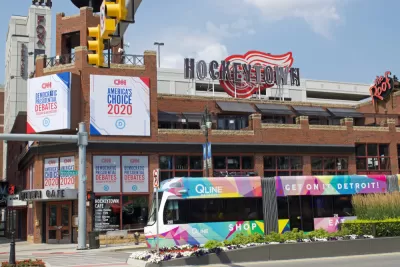A growing chorus of candidates seeking to challenge Donald Trump in 2020 are voicing support for the idea of relaxing zoning and land use restrictions to encourage the development of more housing supply in expensive U.S. cities.

Jenny Schuetz writes the latest in an emerging narrative about the interest of Democratic candidates for president in the nation's housing supply for The Atlantic, even using the word YIMBY to describe the pro-development politics emerging from the more liberal of the two country's political parties.
Schuetz writes:
Last week, Amy Klobuchar became the latest Democratic presidential hopeful to say out loud that cities and towns need to let people build more housing. She joined Cory Booker, Julián Castro, and Elizabeth Warren in proposing a more active federal role in getting state and local governments to loosen zoning rules—a topic that, up to now, has not figured prominently in campaigns for the White House.
According to Schuetz, the interest in the nation's affordability crisis in housing acknowledges that housing is a area of U.S. life that a president should care about and work to improve—even if there are still disagreements on specific. While there is a significant number of newly minted YIMBY among the presidential candidates, there is also, for example, Bernie Sanders, who recently wrote an op-ed that prioritized more traditionally progressive housing policies like rent control, inclusionary zoning for affordable housing, and increased funding for federal housing programs.
The larger narrative Schuetz identifies is that the interest of presidential candidates in housing reflects a middle class currently feeling the pinch.
During the fall of 2008, a glut of subprime home loans had brought the nation’s financial system to the point of collapse, and mortgage foreclosures hit levels not seen since the Great Depression. How the government should respond loomed large over the debates between the nominees, Barack Obama and John McCain. In the race for the 2020 Democratic presidential nomination, several candidates are zeroing in on a different problem in the housing market: Americans are having more and more trouble finding homes and apartments they can afford in the parts of the country where well-paid jobs are being created.
Still, according to Schuetz, despite the emerging electoral interest in housing policy and the housing stress facing many Americans, the candidates' proposals have yet to become a cornerstone of any of the candidates' campaign, and the subject was once again largely absent from the first night of the second round of debates.
FULL STORY: Democrats Hear the ‘Yes in My Backyard’ Message

Study: Maui’s Plan to Convert Vacation Rentals to Long-Term Housing Could Cause Nearly $1 Billion Economic Loss
The plan would reduce visitor accommodation by 25,% resulting in 1,900 jobs lost.

Alabama: Trump Terminates Settlements for Black Communities Harmed By Raw Sewage
Trump deemed the landmark civil rights agreement “illegal DEI and environmental justice policy.”

Why Should We Subsidize Public Transportation?
Many public transit agencies face financial stress due to rising costs, declining fare revenue, and declining subsidies. Transit advocates must provide a strong business case for increasing public transit funding.

Paris Bike Boom Leads to Steep Drop in Air Pollution
The French city’s air quality has improved dramatically in the past 20 years, coinciding with a growth in cycling.

Why Housing Costs More to Build in California Than in Texas
Hard costs like labor and materials combined with ‘soft’ costs such as permitting make building in the San Francisco Bay Area almost three times as costly as in Texas cities.

San Diego County Sees a Rise in Urban Coyotes
San Diego County experiences a rise in urban coyotes, as sightings become prevalent throughout its urban neighbourhoods and surrounding areas.
Urban Design for Planners 1: Software Tools
This six-course series explores essential urban design concepts using open source software and equips planners with the tools they need to participate fully in the urban design process.
Planning for Universal Design
Learn the tools for implementing Universal Design in planning regulations.
Smith Gee Studio
Alamo Area Metropolitan Planning Organization
City of Santa Clarita
Institute for Housing and Urban Development Studies (IHS)
City of Grandview
Harvard GSD Executive Education
Toledo-Lucas County Plan Commissions
Salt Lake City
NYU Wagner Graduate School of Public Service





























